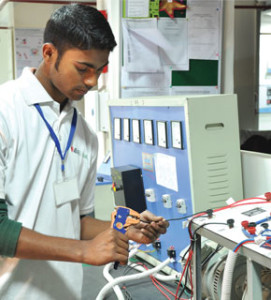
Technology can scale up the skills initiative in the country and technology companies and start-ups have a greater opportunity to succeed in the skills space, shares Dilip Chenoy, CEO & MD National Skill Development Corporation with Elets News Network (ENN)

How do you see vocational education training shaping up and the outlook towards the concept which is helping skill development?
Last six-seven months in particular has seen significant changes in the way that vocational education and training is being perceived and being implemented in the country. Skills has become top of the agenda and also very recently become,with the formation of the Skills Ministry as the top of the government agenda under the Prime Minister. We are seeing a coordinated effort going on acros sschools, colleges, in the ITI and apprentice space with the apprenticeship act has been amended, and in colleges and universities.
For the first time we are seeing from school to work and back to school opportunity for skill development and vocational training. Secondly, skills have now been focused to meet industry standards. A significant amount of money is being spent on skilling through the Prime Minister Kaushal Vikas Yojana. Through independent studies we have found that industry is also recognising the value of hiring certified persons. Certified people are earning more in the workplace within six months of their joining, and in some industries, we are seeing hiring happening only from SSCs. Aspirations for skills also is also growing. So we are seeing speed, scale, standards and addressing aspirations.
Very recently the National First Class Guarantee Scheme was also announced, presenting a different model going forward where the loans will be available for students on the lines of the loans in the education sector. The company has already been set up and it got Rs 500 Cr in the previous budget and going forward the execution of the scheme will start. So we are seeing significant change being led by the PM and the Minister through the Skills Ministry to engage with the governments on one side, whether the state governments and the private sector on the other side through NSDC to achieve the objective of speed, skills and standards.
How can the challenge of low employability of these vocational training graduates be addressed?
If one looks at the ecosystem NSDC is creating, low employability is being determined by the perception that the training is not aligned to the industry and the people are not assessed according to industry standards. So the creation and execution of 33 SSCs, now 37 have been approved by the NSDC Board and we have close to 28 operational, which have created those standards. And what we are finding is that the employability of people who come out of the system that is aligned to this is significantly better. However, attrition is still a big problem. Addressing the issue of employability of people coming from the NSDC ecosystem, we are striving to ensure that the industry certifies that. And going forward in all projections, India is goingto be the skills capital of the world. So we need to train people to maintain international standards and that’s why we are partnering with Australia, USA, Canada,Germany to have transnational standards going forward.
How can technology be leveraged to help this initiative?

Technology is an integral part of skill training ecosystem going forward in multiple ways. The first is in mobilisation and we have to use radio, TV, mobile phones, websites to be able to help mobilisation. Second is in ensuring and enabling good content to be delivered in distributed networks. Then we have agencies and organisations involved in delivery of this content through remote classrooms, online certification and various other technologies involved. So it is not brick and mortar, but click and mortar because without that you cannot scale. And we are using technology in multiple ways like the innovation platform where eight people have been funded. More and more technology companies and start-ups have a greater opportunity to succeed in the skills space if entrepreneurs take this up.
Is there a need to redesign and rescale the curriculum in schools and colleges from the skilling perspective?

CEO & MD National Skill Development Corporation
Firstly we are introducing skill development programme in class IX, X, XI and XII. Second thing being done is programmes in community colleges aligned to job roles, so we require new curriculum for that. Thirdly, we are also doing add-on courses in the graduate and post-graduate level under the UGC, which will require new curriculum. However,there is a need to take the English language being taught in schools and attune it differently to addresses the communication skills. How does one introduce different elements in Mathematics to create numerical ability? That’s what we are trying to do in the next stage by defining what does it mean to be 5th pass, 8th pass etc. So emphasis will be more on basic numeric skills and basic English skills. It’s a bit difficult to do because there is no uniformity across the boards in the country. But the understanding has come on board. And because of that at least for the skills programmes in schools, colleges, engineering colleges, management colleges, they will actually change the way that students look at management education and therefore aligning the management schools in India with the needs of the industry. We are also seeing the development of the National Skills University coming up. But the challenge there is to ensure that we don’t repeat the mistakes of engineering where we have more engineers than ITI graduates because that’s not the way the workforce is. Already here significant change in curriculum is visible. What will also drive it is the credit transfer framework that was announced in November last year by MHRD giving a great mobility to students.




















